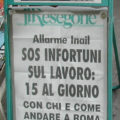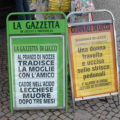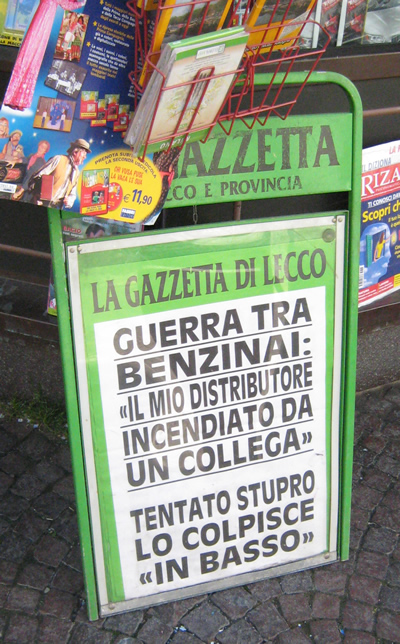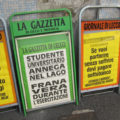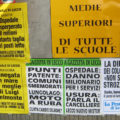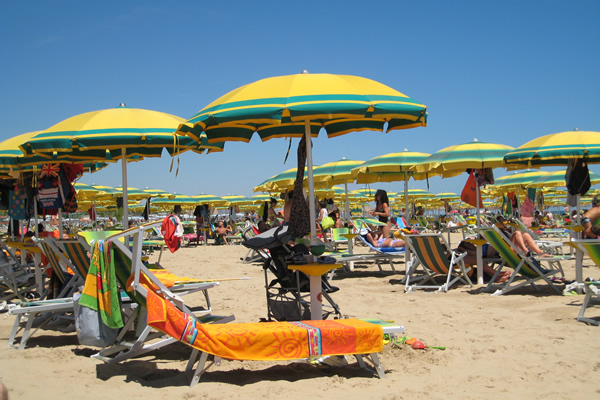Certain MomentsPierangelo Bertoli, 1980 A song in favor of a woman’s right to choose, from a time when either choice to be made for an unwanted pregnancy resulted in social stigma. Unfortunately, the song is relevant still today. For the moment (2008), abortion is legal in Italy, but the political right wing and the Catholic church are doing what they can to make obtaining an abortion – or even birth control – more difficult. Teenage pregnancy has not been a big phenomenon in Italy to date, but at this rate… A year or two ago we went out to dinner at Taverna ai Poggi, a restaurant near our home in Lecco. The only table left was in the basement, alongside a large (pre-arranged) banquet of some sort. We were a merry little bunch, and the restaurant staff kept apologetically asking us to quiet down so we wouldn’t disturb the other group. Perforce, we listened to them, and were astonished to hear a long recital of vitriolic anti-abortion poetry. Had I had my wits about me, I should have replied with this song. |
|||
| Anna che hai scavalcato le montagnee hai preso a pugni le tue tradizioni lo so che non é facile il tuo giorno ma il tuo pensiero é fatto di ragioni i padri han biasimato la tua azione la chiesa ti ha bollato d’eresia i cambiamento impone la reazione e adesso sei il nemico e cosi’ sia ritornello: Credo che in certi momenti il cervello non sa piu’ pensare e corre in rifugi da pazzi e non vuole tornare poi cado coi piedi per terra e scoppiano folgore e tuono non credo alla vita pacifica non credo al perdono Adesso quando i medici di turno rifiuteranno di esserti d’aiuto perchÉ venne un polacco ad insegnargli che é piu’ cristiano imporsi col rifiuto pretenderanno che tu torni indietro e ti costringeranno a partorire per poi chiamarlo figlio della colpa e tu una Maddalena da pentire. (ritornello) Volevo dedicarti quattro righe, per quanto puo’ valere una canzone credo che tu abbia fatto qualche cosa anche se questa é solo un’opinione che lascerai il tuo segno nella vita e i poveri bigotti reazionari dovranno fare senza peccatrici saranno senza scopi umanitari (ritornello x2) |
Anna, [you] who have climbed the mountainsand have beaten up your traditions
I know your day isn’t easy but your thought is made up of [correct] reasons The fathers have censured your action the church has declared you a heretic change requires reaction and now you’re the enemy, and so be it. refrain: I believe that in certain moments the brain doesn’t know how to think anymore and runs into crazy refuges and doesn’t want to return then I fall with my feet on the ground and lightning and thunder explode I don’t believe in the peaceful life, I don’t believe in pardon. Now that the doctors on duty will refuse to help you because a Polack* came to teach them that it is more Christian to impose oneself by refusal They will expect that you turn back and they will force you to give birth to then call him “child of shame” and you a Magdalene to repent. (refrain) I wanted to dedicate four lines to you, for whatever a song may be worth I believe you have done something, although this is only an opinion, that will leave your sign in life and the poor reactionary bigots will have to do without [female] sinners they will be without humanitarian aims. |
||
| * Polacco in Italian is not a pejorative term. It merely connotes a male citizen of Poland, in this specific case, Karol Wojtyla, aka the late Pope John Paul II. However, I think the context justifies using the pejorative English term rather than the neutral (and potentially confusing, in spite of capitalization) “Pole”. | |||
|
if you find this useful and want more, let me know! |
|||
Category Archives: Italian culture
Everyday Italian: Newspaper Headlines 16
They cheat us [fregare] on the gas bills.
Everyday Italian: Newspaper Headlines 14
War between gas stations: “My distributor [gas pump] set on fire by a colleague.”
Attempted rape – she hits him “below the belt.” [Good for her!]
Religious Belief vs. Health Care – Tolerating the Intolerable in Italy
Britain’s Telegraph carries an opinion piece titled If Muslim doctors are intolerant, let them go, according to which a few young Muslim medical trainees have been allowed to refuse to see female bodies or to treat alcohol-related problems, on religious grounds. Sainsbury’s, a UK grocery chain, allows its checkout staff to refuse to scan alcohol if they have religious objections, and there have apparently been cases of taxi drivers refusing passengers who were carrying alcohol.
The opinion piece decries all this – if you’re hired to do a job involving the public, you should not be allowed to discriminate among that public for any reason – and I agree.
The medical question is the most important: to what extent do doctors have a right to refuse treatment that they personally disagree with? The American fundamentalist Christian pharmacists who refuse to fill prescriptions for birth control pills are not carrying out their duty to serve the public; they are conveyors of a necessary public good, and have no right to impose their beliefs on their customers. If you can’t stand the birth control, get out of the pharmacy.
At least in America and Britain there is resistance to these attitudes and attempted practices. In Italy, we have silent acquiescence in similarly unethical behavior by Catholic medical personnel.
When my daughter’s class had (two short sessions of) sex education during her second year of high school here in Lecco, they were warned by the local family health doctor who came to teach them that, while abortion is legal in Italy (and their parents don’t even have to be involved), they would have trouble obtaining an abortion in Lecco (a very Catholic town).
Several of her friends learned the hard way that even obtaining the morning-after pill (also perfectly legal in Italy, but requiring a prescription) can be difficult. One friend went to the hospital (accompanied by her boyfriend) immediately after a condom accident to request it. The doctors and nurses in the ob/gyn department jeered at her and refused. Wandering, crying, through the halls, she eventually ran into a sympathetic doctor who exclaimed furiously “They have no right!” and wrote her the prescription. Othere friends have told Ross similar stories.
An American friend living in Tuscany (fully grown with a teenage daughter) was refused an IUD by her family doctor, on the grounds that this doctor believed the device to be an abortifacient.
The other day I had a routine gynecological exam and pap test. I’ve been thinking about the problem of long-term birth control, so I asked the doctor how one goes about getting sterilized in Italy, and how much it costs. He told me that a sterlization operation is free and easily obtained in Italy (for both sexes), but that I would not be able to do it in Lecco.
To say I was astonished is to put it mildly.
“So I’m supposed to have all the babies god sends me?” I demanded.
“No comment,” he said drily (and in English).
He said I could easily get it done in the nearby hospital of Merate: “What does it matter when you can do it just 20 km down the road?”
How about the principle of the thing? And the law? In a worst-case scenario, what if the Catholic fundamentalist attitude prevalent in Lecco were to spread? Suppose someone found herself in Lecco’s hospital in some serious condition requiring a therapeutic abortion – would they still refuse? Could they, legally? Would anyone bother to enforce the law, whatever it is? Or do we, as usual, just put up with it because “that’s the way it’s always been” and find a workaround? And who are these goddamned Catholics to tell me what to do with my body?
Some of this was old news – Pierangelo Bertoli wrote a song about it decades ago: Certi Momenti.
Oct 29, 2007: Benedict appeals to pharmacists –
“They shouldn’t have to sell ‘immoral drugs’, pope says” – And do you know what I say to the Pope? I’m sure you can figure it out…
Where Italians Go on Vacation
Someone asked on Frommer’s: “Where do Italians go on vacation?”
The majority go to the beach. For at least a century, a seaside vacation has been considered healthful: during the Fascist period, ocean front “colonies” were built, where urban children could be sent to escape the grime of the cities.
The month-long summer vacation is still a reality for many Italians, who transfer their families (often including one or more grandparents) to a seaside hotel, apartment, or a trailer and tent in a campground. Even if Dad’s working, Mom and the kids will be there, with Dad perhaps driving down at weekends. Many families own second homes at or near the seaside, so take their vacations in the same place, year after year. It seems to be part of Italian culture to crave the comfort of familiarity and routine, even when you’re away from home.
Italy is a long peninsula, and also owns a lot of islands in a range of sizes, so there are plenty of beaches to go to, depending on your tastes and the size of your wallet. Choices range from the upscale, such as Portofino, Sardegna’s “Emerald Coast”, and Capri to… places that normal people can afford.
For family reasons, most of my Italian beach experiences to date have been very much in the affordable category, in Abruzzo on Italy’s central Adriatic coast. Having grown up in Thailand when it was still an unspoiled tropical paradise, I was astonished the first time I saw the Italian idea of a holiday beach: row after row of umbrellas, so close together that you could barely see the sand between them. I never have learned to see the charm of this.
(^ The photo at top shows a relatively roomy beach, by some Italian standards!)
Far from being relaxing, Italian resort towns are usually buzzing with activity: from early morning until late at night, you see (and hear) everyone (old and young) out and about, swimming, sunning (yes, tanning is still considered healthy here), strolling, chatting, eating gelato, being “animated“, until late at night. At least the afternoon siesta is held sacred!





